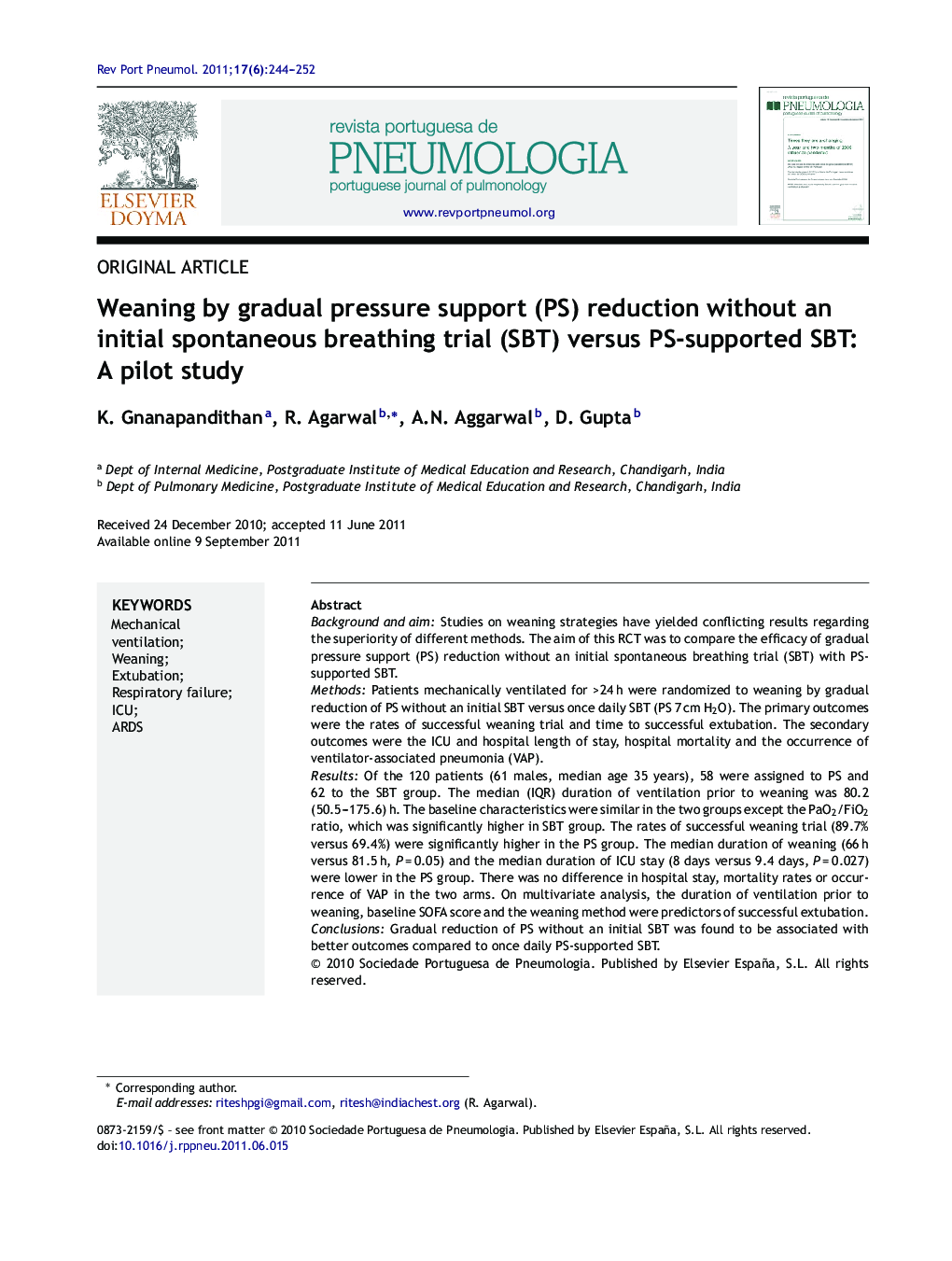| کد مقاله | کد نشریه | سال انتشار | مقاله انگلیسی | نسخه تمام متن |
|---|---|---|---|---|
| 4213820 | 1280942 | 2011 | 9 صفحه PDF | دانلود رایگان |

Background and aimStudies on weaning strategies have yielded conflicting results regarding the superiority of different methods. The aim of this RCT was to compare the efficacy of gradual pressure support (PS) reduction without an initial spontaneous breathing trial (SBT) with PS-supported SBT.MethodsPatients mechanically ventilated for >24 h were randomized to weaning by gradual reduction of PS without an initial SBT versus once daily SBT (PS 7 cm H2O). The primary outcomes were the rates of successful weaning trial and time to successful extubation. The secondary outcomes were the ICU and hospital length of stay, hospital mortality and the occurrence of ventilator-associated pneumonia (VAP).ResultsOf the 120 patients (61 males, median age 35 years), 58 were assigned to PS and 62 to the SBT group. The median (IQR) duration of ventilation prior to weaning was 80.2 (50.5–175.6) h. The baseline characteristics were similar in the two groups except the PaO2/FiO2 ratio, which was significantly higher in SBT group. The rates of successful weaning trial (89.7% versus 69.4%) were significantly higher in the PS group. The median duration of weaning (66 h versus 81.5 h, P = 0.05) and the median duration of ICU stay (8 days versus 9.4 days, P = 0.027) were lower in the PS group. There was no difference in hospital stay, mortality rates or occurrence of VAP in the two arms. On multivariate analysis, the duration of ventilation prior to weaning, baseline SOFA score and the weaning method were predictors of successful extubation.ConclusionsGradual reduction of PS without an initial SBT was found to be associated with better outcomes compared to once daily PS-supported SBT.
ResumoAntecedentes e objetivoOs estudos sobre estratégias de desmame tiveram resultados controversos em relação à superioridade de métodos diferentes. O objetivo deste RCT foi comparar a eficácia da redução gradual da pressão de suporte (PS) sem uma prova de respiração espontânea (SBT) inicial com a PS apoiada pela SBT.MétodosOs pacientes ventilados mecanicamente por >24 horas foram aleatorizados para desmame por redução gradual da PS sem uma SBT inicial versus a SBT uma vez por dia (PS-7 cm H2O). Os principais resultados foram as taxas de sucesso do teste de desmame e o tempo até a extubação bem sucedida. Os resultados secundários foram o tempo em que estiveram na UCI e no hospital, mortalidade hospitalar e ocorrência de pneumonia associada ao ventilador (VAP).ResultadosDos 120 pacientes (61 homens, média de idade de 35 anos), 58 foram atribuídos ao grupo de PS e 62 ao grupo de SBT. A duração média (IQR) da ventilação antes do desmame foi de 80,2 (50,5–175,6) horas. Os parâmetros basais foram semelhantes nos dois grupos, exceto a taxa PaO2/FiO2, que foi significativamente superior no grupo de SBT. As taxas de testes de desmame bem-sucedido (89,7% versus 69,4%) foram significativamente superiores no grupo de PS. A duração média de desmame (66 versus 81,5 horas, p = 0.05) e a duração média de tempo na UCI (8 versus 9,4 dias, p = 0,027) foi inferior no grupo PS. Não se registaram diferenças no tempo em que estiveram no hospital, taxas de mortalidade ou ocorrência de VAP nos dois grupos. Numa análise multivariada, a duração de ventilação antes do desmame, o índice SOFA basal e o método de desmame foram preditores de uma extubação bem sucedida.ConclusõesDescobriu-se que a redução gradual da PS sem uma SBT inicial estava associada com melhores resultados comparados com PS apoiada pela SBT uma vez por dia.
Journal: Revista Portuguesa de Pneumologia - Volume 17, Issue 6, November–December 2011, Pages 244–252